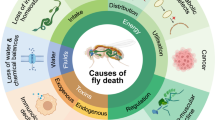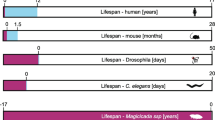Abstract
A diet medium containing 10% (w/v) sucrose can be inferred to be stressful toDrosophila melanogaster from the increased developmental time and reduced size and fecundity of emerging flies. The metabolic basis for this stress and the genetic response to it are of interest from the point of view of both metabolic regulation and the evolutionary genetics of adaptation to stress. Here the effects of a high-sucrose diet on live weight, total protein, stored lipid and glycogen, and crude activities of 12 enzymes involved in energy metabolism were quantified. Assays were done on a large population ofDrosophila that had been acclimated to the laboratory. A collection of eggs was divided to produce two replicate populations maintained on standard medium and two replicates maintained on high-sucrose medium for 133 generations. At the end of this period, both control and sucrose-selected populations were tested on standard and on high-sucrose medium. Results showed that the immediate effect of the high-sucrose diet (compared to standard medium) for both populations was a reduction in live weight and total protein, and activities of many of the enzymes were also reduced by the sucrose treatment, even after adjusting for the weight effect. Selection resulted in several changes on both the standard and the sucrose medium, but the direction of change was not always the same as the acute effect. In no case was there a significant medium by selection-treatment interaction. The pattern of phenotypic correlations did not resolve the reasons for the direction of the genetic responses. Correlations were generally stable across diets and after selection, but there were notable exceptions.
Similar content being viewed by others
References
Barbancho, M. (1992). Effects of dietary ethanol acetaldehyde 2-propanol and acetone on the variation of several enzyme activities involved in alcohol metabolism ofDrosophila melanogaster adults.Insect Biochem. Mol. Biol. 22269.
Bownes, M., and Blair, M. (1986). The effects of a sugar diet and hormones on the expression of theDrosophila yolk-protein genes.J. Insect Physiol. 32493.
Cavener, D. R. (1984). Response of theG6pd and6Pgd polymorphisms inDrosophila melanogaster to dietary selection.Genetica 6381.
Chen, C.-P., and Walker, V. K. (1993). Increase in cold-shock tolerance by selection of cold resistant lines inDrosophila melanogaster.Ecol. Entomol. 18184.
Clark, A. G., and Wang, L. (1994). Comparative evolutionary analysis of metabolism inDrosophila.Evolution 481230.
Collins, J. F., Duke, E. J., and Glassman, E. (1970). Nutritional control of xanthine dehydrogenase I. The effect in adultDrosophila melanogaster of feeding a high protein diet to larvae.Biochim. Biophys. Acta 208294.
Geer, B. W., and Laurie-Ahlberg, C. C. (1984). Genetic variation in the dietary sucrose modulation of enzyme activities inDrosophila melanogaster.Genet. Res. 43307.
Geer, B. W., Woodward, C. G., and Marshall, S. D. (1978). Regulation of the oxidative NAPD-enzyme tissue levels inDrosophila melanogaster. II. The biochemical basis of dietary carbohydrate andDrosophila glycerate modification.J. Exp. Zool. 203391.
Geer, B. W., Williamson, J. H., Cavener, D. R., and Cochrane, B. J. (1981). Dietary modulation of glucose-6-phosphate dehydrogenase (EC 1.1.1.4.9) and 6-phosphogluconate dehydrogenase (EC 1.1.1.44) inDrosophila melanogaster. In Bhaskaran, G., Friedman, S., and Rodriguez, J. G. (eds.),Current Topics in Insect Endocrinology and Nutrition Plenum Press, New York, p. 253.
Geer, B. W., McKechnie, S. W., and Langevin, M. L. (1983). Regulation of sn-glycerol-3-phosphate dehydrogenase inDrosophila melanogaster larvae by dietary ethanol and sucrose.J. Nutr. 1131632.
Geer, B. W., Langevin, M. L., and McKechnie, S. W. (1985). Dietary ethanol and lipid synthesis inDrosophila melanogaster.Biochem. Genet. 23607.
Geer, B. W., McKechnie, S. W., Bentley, M. M., Oakeshott, J. G., Quinn, E. M., and Langevin, M. L. (1988). Induction of alcohol dehydrogenase by ethanol inDrosophila melanogaster.J. Nutr. 118398.
Geer, B. W., McKechnie, S. W., Heinstra, P. W. H., and Pyka, M. J. (1991). Heritable variation in ethanol tolerance and its association with biochemical traits inDrosophila melanogaster.Evolution 451107.
Geer, B. W., Heinstra, P. W. H., and McKechnie, S. W. (1993). The biological basis of ethanol tolerance in Drosophila.Comp. Biochem. Physiol. 105B203.
Heinstra, P. W. H., Seykens, D., Freriksen, A., and Geer, B. W. (1990). Metabolic physiology of alcohol degradation and adaptation inDrosophila larvae as studied by means of carbon-13 nuclear magnetic resonance spectroscopy.Insect Biochem. 20343.
Hickey, D. A., and Benkel, B. F. (1982). Regulation of amylase activity inDrosophila melanogaster: Effects of dietary carbohydrate.Biochem. Genet. 201117.
Hickey, D. A., Benkel, B. F., Magoulas, C., Sasseville, M., Genest, Y., and Payant, Y. (1987). Expression of alpha amylase genes inDrosophila repression by dietary monosaccharides and derepression by cyclic amp.Genetics 116251.
Hoffmann, A. A. (1993). Selection for adult desiccation resistance inDrosophila melanogaster: Fitness components, larval resistance and stress correlations.Biol. J. Linn. Soc. 4843.
Hoffmann, A. A., and McKechnie, S. W. (1991). Heritable variation in resource utilization and response in a winery population ofDrosophila melanogaster.Evolution 451000.
Hoffmann, A. A., and Parsons, P. A. (1991).Evolutionary Genetics and Environmental Stress Oxford University Press, Oxford.
Hung, S. S. O., and Storebakken, T. (1994). Carbohydrate utilization by rainbow trout is affected by feeding strategy.J. Nutr. 124223–230.
Krebs, R. A., and Loeschcke, V. (1994). Effects of exposure to short-term heat stress on fitness components inDrosophila melanogaster.J. Evol. Biol. 739.
McKechnie, S. W., and Geer, B. W. (1984). Regulation of alcohol dehydrogenase inDrosophila melanogaster by dietary alcohol and carbohydrate.Insect Biochem. 14231.
McKechnie, S. W., and Geer, B. W. (1993). Micro-evolution in a wine cellar population: An historical perspective.Genetica 90201.
Oakeshott, J. G., Cohan, F. M., and Gibson, J. B. (1985). Ethanol tolerances ofDrosophila melanogaster populations selected on different concentrations of ethanol supplemented medium.Theor. Appl. Genet. 69603.
Robertson, F. W. (1966). The ecological genetics of growth inDrosophila. VIII. Adaptation to a new diet.Genet. Res. 8165.
Sokal, R. R., and Rohlf, F. J. (1985).Biometry 2nd ed., Freeman, New York.
Thompson, D. B., Treat-Clemons, L. G., and Doane, W. W. (1992). Tissue-specific and dietary control of alpha-amylase gene expression in the adult midgut ofDrosophila melanogaster.J. Exp. Zool. 262122.
van Herrewege, J., and David, J. R. (1984). Extension of life duration by dietary ethanol inDrosophila melanogaster: Response to selection in two strains of different origins.Genetica 6361.
Wilkinson, G. S., Fowler, K., and Partridge, L. (1990). Resistance of genetic correlation structure to directional selection inDrosophila melanogaster.Evolution 441190.
Author information
Authors and Affiliations
Rights and permissions
About this article
Cite this article
Wang, L., Clark, A.G. Physiological genetics of the response to a high-sucrose diet byDrosophila melanogaster . Biochem Genet 33, 149–165 (1995). https://doi.org/10.1007/BF00554727
Received:
Revised:
Issue Date:
DOI: https://doi.org/10.1007/BF00554727




